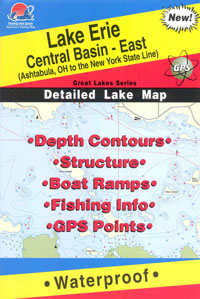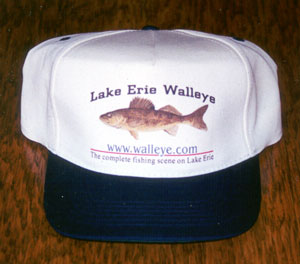Hang ‘Em High Smallmouth
by Ron Anlauf
A big smallie busting a lure up on top is about
as exciting as it can get
 and
really gets your heart pounding. A lot of the fun is in the
anticipation, and knowing that at any moment the surface might explode
and you finally get your chance to go toe to toe with a fish that has
a superb “A” game. If there’s a downside it could be that the
opportunities for nailing topwater smallmouth are rather limited, or
at least that’s the accepted rule of thumb.
and
really gets your heart pounding. A lot of the fun is in the
anticipation, and knowing that at any moment the surface might explode
and you finally get your chance to go toe to toe with a fish that has
a superb “A” game. If there’s a downside it could be that the
opportunities for nailing topwater smallmouth are rather limited, or
at least that’s the accepted rule of thumb.
Team Crestliner member and bass head John
Janousek of Nisswa, Minnesota has found the rule of thumb to be
unacceptable and offers a different take on topwater and smallmouth
principles; “Most anglers believe you have to have flat dead calm
conditions to be successful with a topwater lure, but I’ve found that
it can happen just about anytime, including some of the windiest
days. Sure flat dead calm is perfect but it doesn’t have to be
perfect for catching smallies on top, in fact the windier the better.
Wind doesn’t stop smallies from feeding and it doesn’t stop them from
inhaling your bait. I’m always working a topwater bait when looking
for fish, which can be a terrific search lure.”
Some of John’s favorites include the Zara Puppy
Spook, Pop-R, Skitter Prop, and a buzz bait like Northland Tackle’s ¼
oz Buzzard Buzzer. “To work the Spook properly keep your rod tip down
and with a short stroke push it down sharply, reel up the slack, and
do it again. When you get the hang of it you can make the bait to
swish back and forth and keep it going and “walk the dog”. Use the
same downward stroke for working the other topwaters (other than the
buzzbait) and keep them moving. The only time I’ll let a lure stall
out is immediately after the strike and only if the fish has missed
it. Letting the bait sit can be more than an aggressive smallie can
stand and they’ll hammer it again; you just have to be patient. When
you do get hit make sure the fish has it before you set the hook.
I’ll try to watch my lure and won’t set unless it’s disappeared, or I
can actually feel the fish. If a fish misses the bait and you set the
hook you’ll yank it out of the zone and blow the chance for a second
strike. Of all the top water options it’s the buzzbait that can be
worked the fastest and makes it your best bet for locating fish.”
Good topwater gear includes baitcasting equipment
like St. Croix’s 6’9” Legend model TBC69MLXF rod and AC200 reel loaded
with eight pound test Trilene XT. The rod has a medium light action
which will help you cast the lighter baits further, and the extra
length will take up more of the slack on the hook set.
John will sometimes double team topwater smallies
that are having trouble actually connecting with the lure; “I’ll keep
a plastic bait like Northland’s Dip-Stick Worm or Slurpies Tube rigged
and ready to go and will have a partner through it in by the bait as
quickly as possible after a swing and a miss. A lot of times they’ll
jump on the plastic and is a great way to turn a miss into a boated
fish.”
Baits are usually ready to go right out of the
box but that doesn’t stop Janousek for tweaking them for better
performance; “I’ll almost always replace the standard hooks with
Mustad Triple Grip Hooks, or Normark Sure Set Hooks, all in red. I’m
not sure why but red hooks can make a difference. Whenever I’ve
worked side by side with lure with red hooks and another without; it’s
the red that get most of the action.”
Where you put topwaters to work for you will
depend on what’s available and it could be rocks, weeds, or a
combination of both. Janousek on where: “On lakes where you have a
combination of rock and weed it’s the rock and weed spots that can
hold most of the fish. Sparse coontail or cabbage weeds and plenty of
rocks is a lead pipe cinch for holding smallmouth bass and something
to look for. Heavier weed beds can also hold good numbers of
smallies and look for the deeper and inside edges to concentrate
fish. Rivers are another hot mid summer option for working on top and
it’s the grass beds that can really stack up with fish.”
The key to success with a topwater bait is
confidence, and not giving up on it right away if doesn’t produce.
With a stick to it attitude you might just surprise yourself and have
an absolute ball on the way. See you on the water.





 and
really gets your heart pounding. A lot of the fun is in the
anticipation, and knowing that at any moment the surface might explode
and you finally get your chance to go toe to toe with a fish that has
a superb “A” game. If there’s a downside it could be that the
opportunities for nailing topwater smallmouth are rather limited, or
at least that’s the accepted rule of thumb.
and
really gets your heart pounding. A lot of the fun is in the
anticipation, and knowing that at any moment the surface might explode
and you finally get your chance to go toe to toe with a fish that has
a superb “A” game. If there’s a downside it could be that the
opportunities for nailing topwater smallmouth are rather limited, or
at least that’s the accepted rule of thumb.